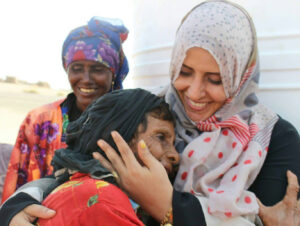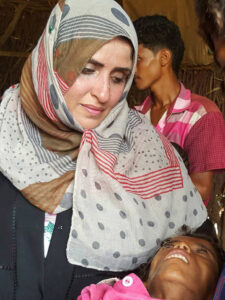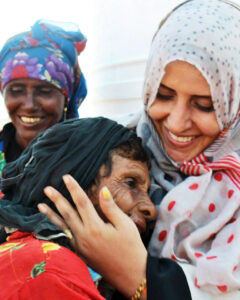Feeding the Hungry in Yemen
Born in 1975 in the Hodeida Governorate, a prominent and most populated region of Yemen whose capital used to be one of the busiest ports in the country, Dr. Moharram comes from a big family – she has 3 brothers and 4 sisters, all highly accomplished. She is, however, the only physician in the family, and has always had a calling for helping others.
Even before the conflict, she had set up a mobile clinic to help the underserved communities in the city of Hodeida and its rural suburbs. “I had my own clinic, and I used my car as a mobile clinic. I started driving around, providing services to the poor families in the villages, in 1999. I wanted to help people who were suffering. Most of them have no skills, most of them are not educated,” explains Dr. Moharram.
When conflict broke out in Yemen in 2014, the situation took an immediate turn for the worse. As the Yemeni authorities battled with the Houthi armed movement, the citizens bore the brunt of the economic and humanitarian crisis brought about by the war. Multiple human rights violations have been registered by local and international activists, including 2019 Aurora Humanitarian Huda Al-Sarari. In addition, a sea, land and air blockade on Yemen started in 2015.
“There are many illnesses that had disappeared but started to appear again because of the war in Yemen – Dengue fever, cholera, even diphtheria.”
Many of Dr. Moharram’s siblings left the country, but she decided to stay. “Most of the factories closed down, schools closed down. And most of the doctors left. I couldn’t leave because I think it’s a shame [to leave] when we have a chance to help many people and we stop [doing that]. There are patients suffering from the war, from hunger, starvation, malnutrition,” she says. “There are many illnesses that had disappeared but started to appear again because of the war in Yemen – Dengue fever, cholera, even diphtheria. These diseases came back because of the war and the blockade.”
Such dedication came at a high personal cost – when Dr. Moharram’s husband was diagnosed with a life-threatening heart condition, he had to go to Jordan to receive treatment, because there were no cardiologists and no cardiology centers left open in Hodeida. Their children left with him. Dr. Moharram couldn’t abandon her practice and follow them. Ever since, she has had to do her exceptional work on her own, with no support from her close ones.
Due to the lack of qualified medical professionals, Dr. Moharram now treats patients whose conditions are not even remotely related to her chosen field of obstetrics and gynecology: “I opened my clinic to them as a general [practice] doctor. I [even] work as a dentist! I’m an OBGYN, and sometimes a pregnant woman comes to me with a toothache, and I must help her, because there’s no one else. We try to cover some aspects, but not as specialists – just giving them some analgesics, some antibiotics.”
Today, her mobile clinic is used not only to treat the most vulnerable, but also to deliver food baskets and essentials, including milk for the malnourished children – which she often buys with her own money – to the remote villages hit the hardest by the humanitarian crisis. By her own estimate, each week, at least 150 babies get milk thanks to this project. The war is still ongoing and driving around is dangerous because of the airstrikes and the fighting. Quite often, she can’t access certain areas because the roads are blocked by the armed forces; more than once, she had to fear for her life, being detained and threatened to be thrown in jail.
The city of Hodeida also continues to suffer from power and provision shortages. Electricity is unreliable, with power cuts further disrupting an already unstable situation. Food is not only hard to come by, but extremely expensive and simply unaffordable for many people who have lost their source of income. “This war makes me feel bad, it makes me very sad. The biggest problem is hunger. Most of the people rely on fishing, but they have been prevented from fishing [by the blockade]. They have no income and many, many families are suffering from starvation and severe degrees of malnutrition,” laments Dr. Moharram.
“In 2020, in 2021, there are still cases of starvation. I was shocked when I saw them,” Dr. Moharram says. “What gives me strength to continue my work is the crying of a mother who’s afraid there’s no food for her children. And when they feel fear or hunger, I’m crying for them. But this gives me strength to continue, and I will continue.”




